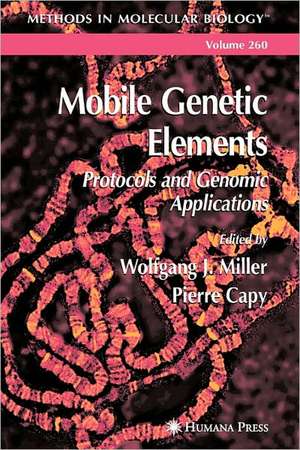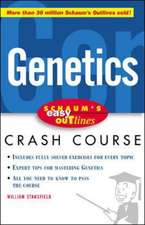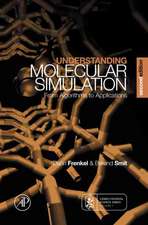Mobile Genetic Elements: Methods in Molecular Biology, cartea 260
Editat de Wolfgang J. Miller, Pierre Capyen Limba Engleză Paperback – 10 noi 2010
| Toate formatele și edițiile | Preț | Express |
|---|---|---|
| Paperback (1) | 717.00 lei 6-8 săpt. | |
| Humana Press Inc. – 10 noi 2010 | 717.00 lei 6-8 săpt. | |
| Hardback (1) | 718.82 lei 6-8 săpt. | |
| Humana Press Inc. – 22 mar 2004 | 718.82 lei 6-8 săpt. |
Din seria Methods in Molecular Biology
- 9%
 Preț: 791.63 lei
Preț: 791.63 lei - 23%
 Preț: 598.58 lei
Preț: 598.58 lei - 20%
 Preț: 882.98 lei
Preț: 882.98 lei -
 Preț: 252.05 lei
Preț: 252.05 lei - 5%
 Preț: 802.70 lei
Preț: 802.70 lei - 5%
 Preț: 729.61 lei
Preț: 729.61 lei - 5%
 Preț: 731.43 lei
Preț: 731.43 lei - 5%
 Preț: 741.30 lei
Preț: 741.30 lei - 5%
 Preț: 747.16 lei
Preț: 747.16 lei - 15%
 Preț: 663.45 lei
Preț: 663.45 lei - 18%
 Preț: 1025.34 lei
Preț: 1025.34 lei - 5%
 Preț: 734.57 lei
Preț: 734.57 lei - 18%
 Preț: 914.20 lei
Preț: 914.20 lei - 15%
 Preț: 664.61 lei
Preț: 664.61 lei - 15%
 Preț: 654.12 lei
Preț: 654.12 lei - 18%
 Preț: 1414.74 lei
Preț: 1414.74 lei - 5%
 Preț: 742.60 lei
Preț: 742.60 lei - 20%
 Preț: 821.65 lei
Preț: 821.65 lei - 18%
 Preț: 972.30 lei
Preț: 972.30 lei - 15%
 Preț: 660.49 lei
Preț: 660.49 lei - 5%
 Preț: 738.41 lei
Preț: 738.41 lei - 18%
 Preț: 984.92 lei
Preț: 984.92 lei - 5%
 Preț: 733.29 lei
Preț: 733.29 lei -
 Preț: 392.60 lei
Preț: 392.60 lei - 5%
 Preț: 746.26 lei
Preț: 746.26 lei - 18%
 Preț: 962.66 lei
Preț: 962.66 lei - 23%
 Preț: 860.22 lei
Preț: 860.22 lei - 15%
 Preț: 652.64 lei
Preț: 652.64 lei - 5%
 Preț: 1055.50 lei
Preț: 1055.50 lei - 23%
 Preț: 883.87 lei
Preț: 883.87 lei - 19%
 Preț: 491.89 lei
Preț: 491.89 lei - 5%
 Preț: 1038.86 lei
Preț: 1038.86 lei - 5%
 Preț: 524.16 lei
Preț: 524.16 lei - 18%
 Preț: 2122.34 lei
Preț: 2122.34 lei - 5%
 Preț: 1299.23 lei
Preț: 1299.23 lei - 5%
 Preț: 1339.12 lei
Preț: 1339.12 lei - 18%
 Preț: 1390.26 lei
Preț: 1390.26 lei - 18%
 Preț: 1395.63 lei
Preț: 1395.63 lei - 18%
 Preț: 1129.65 lei
Preț: 1129.65 lei - 18%
 Preț: 1408.26 lei
Preț: 1408.26 lei - 18%
 Preț: 1124.92 lei
Preț: 1124.92 lei - 18%
 Preț: 966.27 lei
Preț: 966.27 lei - 5%
 Preț: 1299.99 lei
Preț: 1299.99 lei - 5%
 Preț: 1108.51 lei
Preț: 1108.51 lei - 5%
 Preț: 983.76 lei
Preț: 983.76 lei - 5%
 Preț: 728.16 lei
Preț: 728.16 lei - 18%
 Preț: 1118.62 lei
Preț: 1118.62 lei - 18%
 Preț: 955.25 lei
Preț: 955.25 lei - 5%
 Preț: 1035.62 lei
Preț: 1035.62 lei - 18%
 Preț: 1400.35 lei
Preț: 1400.35 lei
Preț: 717.00 lei
Preț vechi: 754.74 lei
-5% Nou
Puncte Express: 1076
Preț estimativ în valută:
137.21€ • 144.27$ • 113.37£
137.21€ • 144.27$ • 113.37£
Carte tipărită la comandă
Livrare economică 16-30 aprilie
Preluare comenzi: 021 569.72.76
Specificații
ISBN-13: 9781617373015
ISBN-10: 161737301X
Pagini: 292
Ilustrații: XII, 292 p.
Dimensiuni: 152 x 229 x 17 mm
Greutate: 0.45 kg
Ediția:Softcover reprint of hardcover 1st ed. 2004
Editura: Humana Press Inc.
Colecția Humana
Seria Methods in Molecular Biology
Locul publicării:Totowa, NJ, United States
ISBN-10: 161737301X
Pagini: 292
Ilustrații: XII, 292 p.
Dimensiuni: 152 x 229 x 17 mm
Greutate: 0.45 kg
Ediția:Softcover reprint of hardcover 1st ed. 2004
Editura: Humana Press Inc.
Colecția Humana
Seria Methods in Molecular Biology
Locul publicării:Totowa, NJ, United States
Public țintă
ResearchCuprins
Mobile Genetic Elements as Natural Tools for Genome Evolution.- Detection of Transposable Elements in Drosophila Salivary Gland Polytene Chromosomes by In Situ Hybridization.- Fluorescent In Situ Hybridization With Transposable Element Probes to Mitotic Chromosomal Heterochromatin of Drosophila.- Southern Blot Analysis of Individual Drosophila Flies.- Computational Analysis of Transposable Element Sequences.- Biochemical Analysis of Long Terminal Repeat Retrotransposons.- Tn5 as a Molecular Genetics Tool.- Gene Targeting in Drosophila.- TE-Based Mutagenesis Systems in Plants.- The Use of Double-Stranded RNA to Knock Down Specific Gene Activity.- The Application of LTR Retrotransposons as Molecular Markers in Plants.- MITE Display.- Retroposon Mapping in Molecular Systematics.- Transformation Systems in Insects.- Transposable Elements for Transgenesis and Insertional Mutagenesis in Vertebrates.
Textul de pe ultima copertă
Transposable elements (TEs)-DNA sequences that are capable of moving from one chromosome location to another-are found in all living organisms. They have been increasingly investigated in a wide spectrum of species, including bacteria, plants, fungi, and animals. In Mobile Genetic Elements: Protocols and Genomic Applications, leading experts describe in step-by-step detail their most productive transposon-based methods and strategies for studying genome structure, function, and evolution. These readily reproducible techniques cover a broad range, including mutagenesis, transgenesis, gene silencing, and molecular systematics. Among the highlights are a series of DNA hybridization methods for analyzing the distribution and dynamics of mobile DNA at the hosts' genomic level, techniques for studying LTR retrotransposons in heterologous host systems, and mutagenesis protocols for investigating gene functions in a broad range of organisms. Additional methods deal with highly informative sets of polymorphic markers, RNAi technology in gene silencing, and applications during transgenesis. The protocols presented follow the successful Methods in Molecular Biology™ series format, each one offering step-by-step laboratory instructions, an introduction outlining the principle behind the technique, lists of equipment and reagents, and tips on troubleshooting and avoiding known pitfalls.
State-of-the-art and highly practical, Mobile Genetic Elements: Protocols and Genomic Applications offers investigators powerful genetic tools for dissecting the function of a specific gene, elaborating on the mechanisms leading to genetic change and diversity, and studying the evolutionary impact of mobile DNA on the biology and evolution of organisms.
State-of-the-art and highly practical, Mobile Genetic Elements: Protocols and Genomic Applications offers investigators powerful genetic tools for dissecting the function of a specific gene, elaborating on the mechanisms leading to genetic change and diversity, and studying the evolutionary impact of mobile DNA on the biology and evolution of organisms.
Caracteristici
Includes supplementary material: sn.pub/extras













